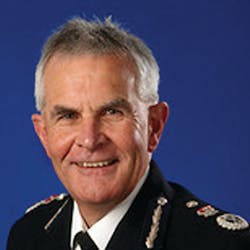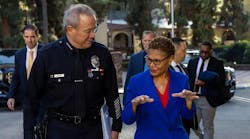In an effort, to gain an international perspective, Law Enforcement Technology contributor Keith W. Strandberg recently spoke with Association of Chief Police Officers (ACPO) Vice President Sir Peter Fahy, who is also Chief Constable of the Greater Manchester (Great Britain) Police force.
LET: What is the role of the APCO?
PF: We have 43 police forces in England and Wales. The Chief Constables got together and formed this association. As there is no federal police force, we regularly meet to agree national policy and communicate with the public. Most of the work is to coordinate policy and best policies. We want to produce one policy rather than 43 different ones.
We feel that there are too many police forces, and they range from 30,000 to 80 officers. The British have never wanted a national police force; it would have too much power. It goes way back to the barons rebelling to the power of the king.
LET: How are things going?
PF: I think [we have] the same challenges that you are facing in the US. The number one issue is the economic situation, the reduction in budgets and the realization that it won’t be getting much better. Other agencies are also facing big budget challenges. Operationally, we are seeing a continued reduction in crime, which is surprising. We thought that in a recession, crime would go up. That hasn’t been the case here, crime continues to go down. Even the brightest criminologists are struggling with the reasons why. Some of the goods that used to be stolen are no longer so expensive, like electrical goods, and the motor vehicle manufacturers are making it harder to steal a new vehicle. I hope that it means that society is getting more civilized.
LET: What is your latest success?
PF: For us, there are two things. Neighborhood policing is a success; this has increased the confidence of communities in police in general, which has allowed us to involve more local agencies. At the other end, there is the work we do on serious and organized crime. We are concentrating on the main offenders and the main families, working with other agencies. For us, it’s about sharing information and blurring the boundaries between other agencies. We are talking really at a local level—the local council, housing departments, health services and others. When it comes down to it, it is a small number of people and families who are sucking up a big proportion of the public spend. A lot of our work is repeat business, it is going back to the same families. We are focussing on demand reduction and problem solving. If we have to reduce our budget, we have to reduce our workload as well.
When you look at it day to day, there is a huge amount of expense on issues like filling in referral forms, partnership meetings, case review, which is poorly coordinated at a local level. There is a big opportunity here in the day to day policing, focusing on how we can reduce our demand and be effective against the long standing problems.
LET: How easy it to work across borders with police from other countries?
PF: On the whole, it is very difficult working with police forces across borders. When we have to work internationally, we work through our Serious and Organized Crime Agency. This can be frustrating, and some cases don’t get dealt with as quickly, this is down to the legal procedures. Often they don’t take into account the use of the Internet and Social Media. When something is hosted in other parts of the world, when we need material from Facebook and other companies based in the US, it goes through a long drawn out process which doesn’t take into account investigation needs.
Do local police forces receive terrorism training?
FP: Overall, terrorism doesn‘t at the moment concern local officers. We tell them where they need to go to get more information. On the other hand, because of great travel and free movement between the UK and Europe, terrorism is becoming more and more of an issue. We are having to make our staff more aware of issues of immigration.
People do have free movement from the EU. A passport would be checked, but once they are here, they have the right of residence.
When it comes to issues of checking out true identities and past offending behavior, we do run into problems. There is no European database. We have only just now created a national database for capturing and sharing information.
We have come up with the structure of the Counter Terrorism Network. We have centers based in five forces, we have one here in Manchester, which has specialist units. We do have a fairly good structure, where we can make a good connection between international, national and local level police quickly. We think that this set up is very important to keep that link.
Our officers are trained to a particular level, gathering intelligence and what to look out for; in higher risk areas, they receive more training. A particular rural force might not see the need to train in terrorism, but on the whole, the forces have held onto the national standards.
LET: What about general training?
PF: When we develop national policy, we have a national training program behind that. There are systems of accreditation, so if you want to be a firearms officer, or a counter terrorism officer, there is national accreditation. We have done a lot of work to achieve national standards and this has been accepted by all the forces.
Our government has issued the strategic policing requirement [that] forces have to maintain a strategic capability – major public disorder, national emergencies, organized crime, firearms, terrorism. It says that you have to play your part in times of national need.
LET: What is the biggest issue facing police forces in the UK?
PF: The key issue for us is around workforce reform. Most of our budget is spent on people and we are facing real challenges. Maintaining the morale of our staff, when there are changes to pensions and a pay freeze, is a major challenge. Everything we do requires a higher level of expertise; it’s about recognizing that we have to change our pay system to recognize expertise rather than rank.
Many thanks to Sir Peter Fahey for taking the time to talk with LET. Look for more law enforcement profiles in coming issues.



